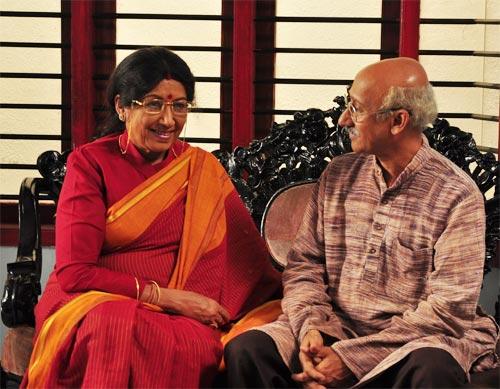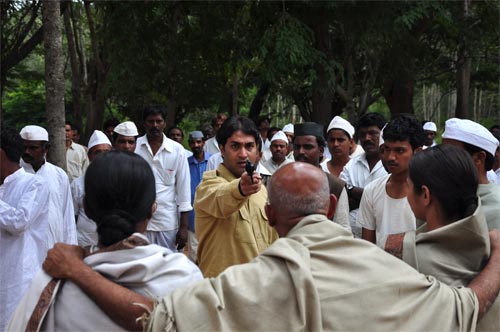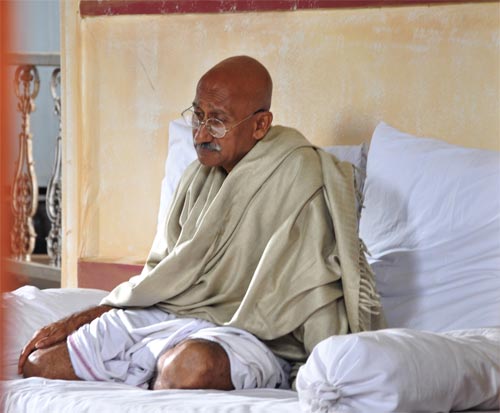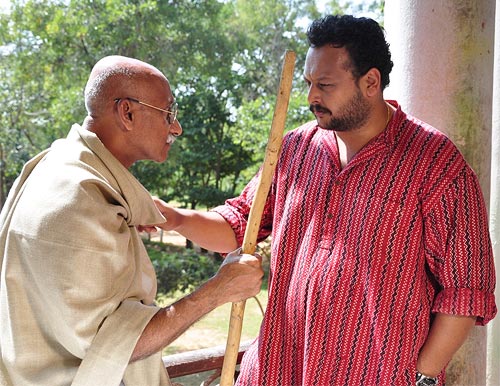 | « Back to article | Print this article |
Girish Kasaravalli wins his 12th National Award with Kurmavatara
Girish Kasaravalli, ace Kannada film-maker has won his third National Award in a row for the best Kannada film with Kurmavatara, taking his total number of National Awards to 12.
His films Gulabi Talkies and Kanasemba Kudureneri won the National Awards in the two preceding years.
Kurmavatara (Lord Vishnu's second avatar) is based on a short story written by K Veerabhadrappa.
Girish Kasaravalli talks about his award-winning film and its relevance in today's word in this interview with Srikanth Srinivasa.
What is Kurmavatara about?
Kurmavatara is about a naive, non-corrupt and about-to-retire government employee, Anand Rao, who has little interest in worldly matters. He doesn't enjoy a good family life. A widower, he lives in a world of his own, detached from his family comprising his son and daughter-in-law.
His striking resemblance to Mahatma Gandhi helps him get a role in a television serial that is based on the father of the nation.
Anand Rao doesn't respect Gandhi nor does he know acting. But he is under pressure to learn about Gandhi for the role. So, he sets himself on an inner journey to rediscover himself.
His past deeds begin to haunt him and he feels guilty about them. He draws a parallel with Gandhi's life especially in respect of his relationship with his son, which is akin to that of Gandhi and his son Harilal. The way he ignored his wife is much like how Gandhi ignored his wife Kasturba.
Girish Kasaravalli wins his 12th National Award with Kurmavatara
How does the title justify the theme of the film?
There is a moment in the movie when there is a mention made about how Lord Vishnu saves the world leaving cracks on the tortoise shell. The title of the film draws upon the mythology of Lord Vishnu's tortoise avatar as a metaphor for the immense backbreaking stress that great responsibility brings even for the strongest among us.
Anand Rao undergoes a subtle inward journey of acquiring a better understanding of his faith and principles, which are ultimately challenged in a materialistic environment. His outward journey of amassing fame and public adulation too proves to be a crown of thorns.
Girish Kasaravalli wins his 12th National Award with mavatara
How is this portrayed on the screen?
When people begin to expect miracles from the Gandhian image that Anand Rao acquires, he fails. He has none of the charisma of Gandhi as he is neither the politician nor the statesman. His personal life begins to show cracks. Even his family members expect miracles from him and they begin to use him.
The acting assignment brings him fame and riches but at the cost of his morality and mental peace. As he metamorphoses into a striking likeness of Gandhi, he is torn between the Gandhian principles of which he acquires a better understanding, and the vested interests of various parties trying to take advantage of his position. He begins to oppose all this as he feels it is against his will.
Meanwhile, his platonic relationship with a popular actress of yesteryear who plays Kasturba is misconstrued as romance leading to a big scandal.
He has a big brawl with his son who walks out on him. He also fails to recommend a Muslim boy, the son of an officer, who becomes close to him, to play a role in the serial. Anand Rao gets fed up after a point and decides to quit.
Girish Kasaravalli wins his 12th National Award with Kurmavatara
What attracted you to this story?
I have always chosen to highlight the conflict between private life and public life. There is a conflict in our persona between private and public that fascinates me. At times we become very private and at times we become very public. This is also a way for me to relate to the current socio-economic environment.
I am affected by the historical past despite the fact that I live in 2012. I cannot live in isolation. There is a fascinating world outside and another interesting world inside, and they are in constant conflict with each other. It is fascinating to capture this conflict that exists to this day and will continue to exist. I can't be blind to what is happening today.
I want to understand Gandhi's relevance to today's age. We need to have at least one ideal and so Gandhism is what comes to our mind very quickly.
What is the relevance of Gandhism in today's world?
We are not projecting our national leaders properly. Gandhism cannot be dismissed. I don't agree when people say that our values have corroded and I cannot talk about them dismissively. It is relevant to this day, but the movement itself is moving in the opposite direction.
We are living in a consumerist society with rightist viewpoint. This film is an attempt to correct these anomalies through Anand Rao's character.
Girish Kasaravalli wins his 12th National Award with Kurmavatara
How fairly have you represented and interpreted the writer's work?
There is total transparency in my work. I show the changes that I make to the writer and take his permission to go ahead with the filming process. There is no hanky-panky or doing a story clandestinely.
Who comprise the cast and crew?
The protagonist is played by Shikaripura Krishnamurthy, who is a Sanskrit professor in St Aloysius College, Mangalore. The film stars Jayanthi in Kasturba's role.
This is my fourth film with producer Basant Kumar Patil. The producer had given me total freedom to film the story. Issac Thomas has scored the music and Swamy has edited the film.




